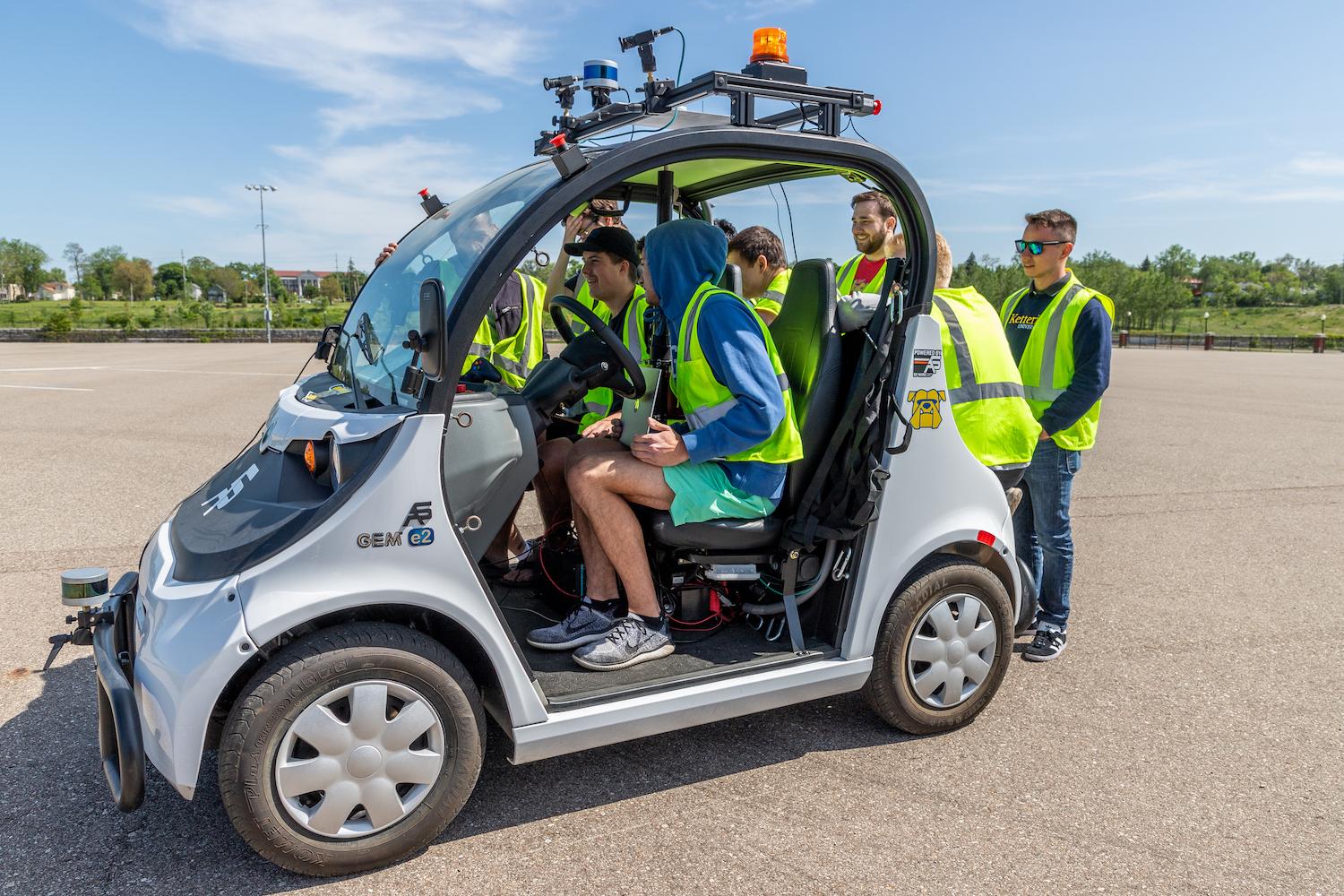
Future-Proofing Our Students: Innovation Leads New Interdisciplinary Offerings
About a year and a half ago, Provost Dr. James Zhang led the deans of the colleges of engineering, sciences and liberal arts, the school of management and the graduate school, along with other leading Kettering faculty, in an ambitious effort “to re-shape the institution to better meet the needs that we know industry of the future is going to require.”
In order to create future-oriented offerings, Kettering needed to develop an interdisciplinary approach with connections to the mobility industry and add others already in the curriculum, such as robotics and cybersecurity, which have far broader applications.
Whether designing smarter cars or machines, developing alternative energies, becoming a tech entrepreneur or launching a med-tech venture, the University is intent on future-proofing students’ careers against the only certainty in today’s professional world: change.
Ultimately, the deans and faculty identified five interdisciplinary perspectives—advanced mobility, new energy vehicles, intelligent manufacturing, artificial intelligence and sustainability—that can be paired with engineering, computer science, and management disciplines to allow students and graduates to be nimble as the careers of the future unfold.
“This set of creative, and even revolutionary, initiatives is only the latest in a variety of curricular changes that we have made in recent years in recognition of the fact that skill sets can quickly become obsolete,” University President Dr. Robert K. McMahan said. “In looking ahead, anticipating change and embracing adaptability, they embody a dynamic—present relevance and future readiness—that we must instill in our students to prepare them for a future that is both here and ever-changing.”
In elaborating on the need for adaptability, fluidity and interdisciplinary focuses, Zhang pointed out that “the automotive industry has evolved into a technology platform. Before, you had the OEMs like the Big Three automakers and a lot of suppliers. Today, Google is playing on the platform. Intel is playing on it. The automobile has essentially become an intelligent, movable robot, and technologies from many different industries contribute to that, so everyone is playing on the platform.”
The first two focuses—advanced mobility and new energy vehicles—relate to Kettering’s traditional automotive (now mobility) priority. The three other categories—artificial intelligence, intelligent manufacturing and sustainability—extend across the industrial spectrum. Of these, Zhang noted, “Artificial intelligence really is an overarching technology which can be used to advance many industries.”
5 academic Focus Areas
Advanced Mobility
- Advanced driver assistance systems
- Deep neural network for environment perception
- VR/AR/mixed reality
- V2X communication systems
New Energy Vehicles
- Battery development and energy storage
- Battery management systems
- Power electronics (charging devices, electric motor design, etc.)
- Battery materials (anode and cathode, separator, electrolyte, etc.)
- Fuel cells
Intelligent Manufacturing
- Additive manufacturing
- Industry robotics/digital twinning
- Big data analytics
- Industrial Internet of Things
Artificial Intelligence
- AI technologies
Sustainability
- Sustainable materials
- Environmental sustainability
- Renewable energy
Intelligent manufacturing is already represented in the curriculum within the Bachelor of Science in Engineering degree with concentrations in robotics and mechatronics systems, which combines mechanics, electronics and computing to create simpler, smarter manufacturing systems. To those two the committee has added focuses such as digital twinning (recreating a physical asset in a digital format), big data analytics and additive manufacturing, which is akin to 3D printing.
Finally, sustainability, which is a buzzword across all of industry, does not refer at Kettering to things like wind or solar energy but “to manufacturing processes which are clean and products, such as plastics, which will not create pollution or an environmental hazard,” Zhang said.
For example, the evolving science behind the critical recycling of the batteries that support electrification may fall within the purview of sustainability.
It is important to understand how these recently developed areas of focus “logically interact with our majors,” physicist Dr. Katherine Svinarich said. Svinarich was the Dean of the College of Sciences and Liberal Arts during the development work but now serves as Chief of Staff.
“We have a suite of courses focusing on those areas that students are able to combine as a minor,” she said. “But they all require, like the world at large, a multidisciplinary approach.”
In other words, a mechanical engineer can now have a specialized focus in sustainability, intelligent manufacturing or artificial intelligence and can apply this knowledge to the latest developments in mobility or a variety of other industries.
Zhang believes Kettering to be the only academic institution that has integrated these five interdisciplinary focuses into its curriculum. It is an innovative approach designed to provide students, across and within a variety of majors and fields, additional capabilities now and abilities to adapt going forward to a rapidly changing future.










